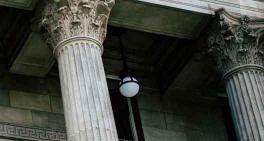Supreme Court won’t revive school’s transgender bathroom ban
National News
The Supreme Court on Monday rejected a Virginia school board’s appeal to reinstate its transgender bathroom ban.
Over two dissenting votes, the justices left in place lower court rulings that found the policy unconstitutional. The case involved former high school student Gavin Grimm, who filed a federal lawsuit after he was told he could not use the boys bathroom at his public high school. Justices Samuel Alito and Clarence Thomas voted to hear the board’s appeal.
The Gloucester County, Virginia, school board’s policy required Grimm to use restrooms that corresponded with his biological sex — female — or private bathrooms.
Seven years ago, Grimm was barred from using the boys restroom when he was a 15-year-old student at Gloucester High School. He sued a year later, and his case has worked its way through the courts ever since.
After learning that the Supreme Court refused to hear the case, Grimm, now 22, said that his long court battle is over. “We won,” he tweeted. “Honored to have been part of this victory,” he added.
David Corrigan, an attorney for the school board, did not immediately respond to email and voice mail messages seeking comment.
In its petition asking the Supreme Court to hear the case, the school board argued that its bathroom policy poses a “pressing federal question of national importance.”
The board argued previously that federal laws protect against discrimination based on sex, not gender identity. Because Grimm had not undergone sex-reassignment surgery and still had female genitalia, the board’s position has been that he remained anatomically a female.
The American Civil Liberties Union, which represented Grimm in his years long lawsuit against Gloucester, argued that federal law makes it clear transgender students are protected from discrimination.
Related listings
-
High court to rule whether to hear Maine school choice case
National News 06/25/2021The justices of the U.S. Supreme Court are set to decide whether to hear a case filed by Maine families who want to use a state tuition program to send their children to religious schools. The case concerns a Maine Department of Education rule that a...
-
Most virus-related restrictions lifted for Kentucky courts
National News 05/18/2021Kentucky’s Supreme Court has ended most coronavirus-related restrictions for the state’s court system effective immediately, Chief Justice John D. Minton Jr. said Tuesday. The high court entered administrative orders eliminating most heal...
-
Lawsuit seeks Confederate statue’s removal from courthouse
National News 05/05/2021Civil rights advocates sued a Maryland county on Wednesday to seek the court-ordered removal of a Confederate monument from a courthouse lawn on the state’s Eastern Shore, calling it a racist symbol of oppression.In their federal lawsuit, an NA...

Chicago Business Fraud Attorney
Business Fraud can take many forms. In the broadest terms, a fraud occurs when someone intentionally deceives others for personal gain. Many times business fraud is harmful and recovery is necessary. Losing your personal or business’s assets can devastate your entire life. Contact Roth Law Groupto receive help on restoring your business to normalcy before you were victimized with fraud. Business fraud cases can involve multiple people and complicated schemes aimed at deceiving the public, auditors, investigators, or others. Whether you are dealing with corporate fraud or commercial fraud, we can step in and fight back to receive compensation that you deserve.
At Roth Law Group we are devoted to prosecuting and defending the legal rights of individuals and small businesses, as either plaintiff or defendant. Proving fraud can be extremely difficult. To have a successful business fraud case, one must prove that the defendant purposefully set out to defraud the victim. Fraud cases are being investigated more aggressively than ever. With increasing federal regulation and scrutiny of corporate practises, many individuals and businesses find themselves the subject of business fraud investigations.



